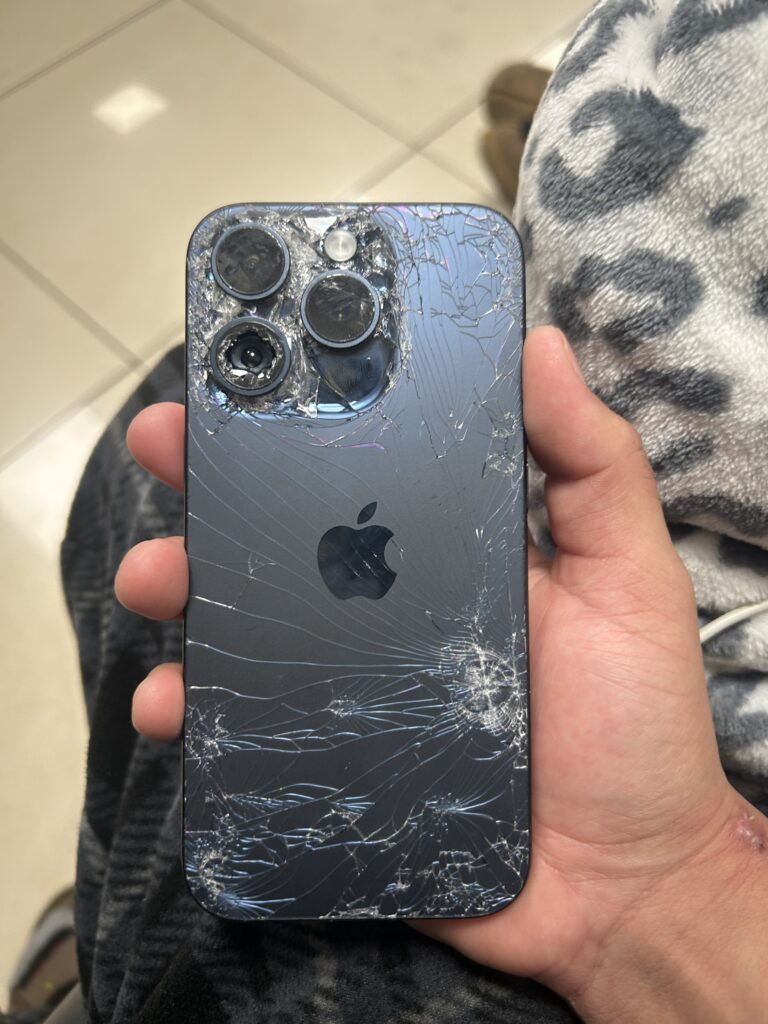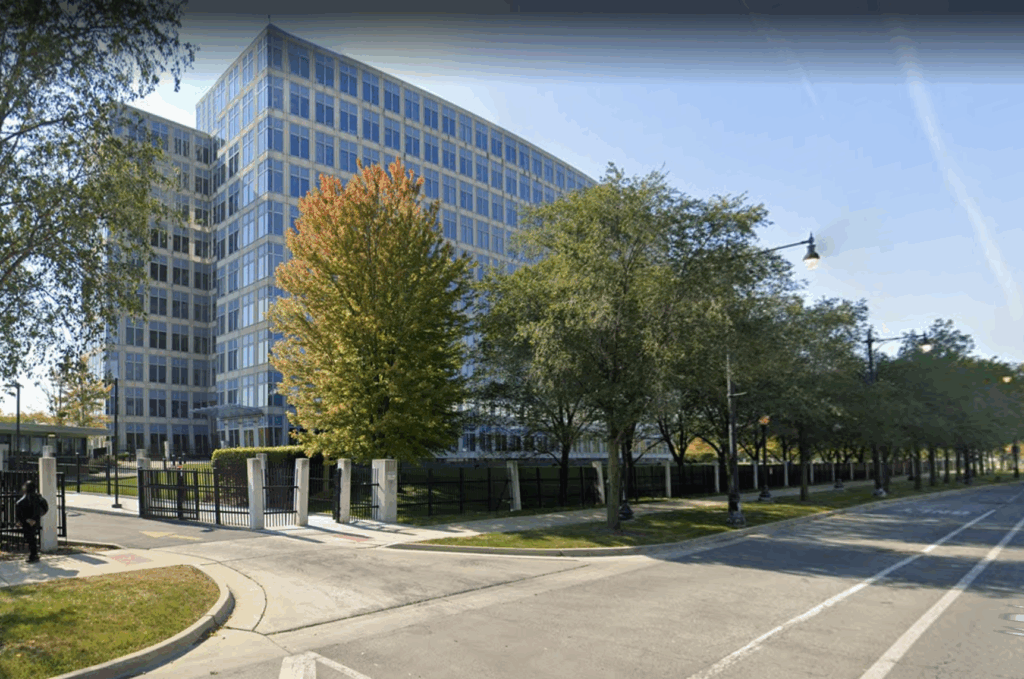On the afternoon of November 6, Ricardo Cruz, nineteen, and his mother drove to the Citgo gas station on the corner of 63rd Street and California Avenue to pump air in their truck’s tire. Before they could, the sharp sounds of car horns broke out nearby. Cruz quickly realized it wasn’t ordinary traffic noises—it was a local rapid response team alerting the neighborhood that federal immigration agents were nearby.
Cruz didn’t hesitate to act. He and his mother got back into the truck and joined the caravan of cars sounding the alarm.
“We didn’t even put air in the tire,” Cruz said. “We just left. We followed the cars along. Started beeping and screaming out trying to warn others ICE was around.”
In Chicago neighborhoods, residents and community groups have built informal networks to monitor and respond quickly to potential immigration enforcement activity. Residents use coordinated horn-blaring caravans to shadow federal vehicles, document operations and alert neighbors. Drivers honk, cyclists blow whistles and text networks distribute licence-plate numbers of unmarked vehicles. These tactics are part of a broader grassroots resistance.
Cruz and other community members tailed agents through Chicago Lawn and Gage Park.

But he soon found himself boxed in by agents near the corner of 59th Street and Maplewood Avenue. Cruz came to a complete stop as masked Customs and Border Protection (CBP) agents in khaki camouflage combat uniforms and ballistic helmets hopped out of two cars. He estimates there were about ten cars in the caravan he joined, and about five immigration enforcement vehicles.
Cruz, who had the windows rolled down, said agents aggressively approached him, yelling profanities at him and his mother, as federal agents pried their heads and arms through the windows, trying to unlock the truck and demanding they exit. They forced his mom out first.
In a video recorded and saved on Snapchat by Cruz, during the altercation an agent yelled, “He [Cruz] just spit on me,” which the video does not show.
From inside Cruz’s truck, the video shows at least one federal agent in full camouflage gear leaning deep into the driver’s side window. The agent’s body is positioned inches from Cruz and his mother, moving forcefully and appearing to try to gain control of the inside of the truck. The vehicle is stopped, and Cruz can be seen holding his phone as the agent continues pushing into the window space.
The masked agent swiped at Cruz with a gloved hand.
“They literally grabbed my head. They were pulling my hair and they banged it on the car that was parked,” Cruz said. “I was scared. I thought they were going to break the window of the car by banging my head on it.”
According to Cruz, agents banged his head on a parked car at least two or three times. Agents yelled for Cruz to stop resisting as he lay on the street with several agents piled on top of him to handcuff him. “I thought they were gonna break my arm.”
Once handcuffed, agents began to say, “He’s kicking, he’s kicking.” This prompted agents to pepper spray Cruz, which can be heard in his video.
“I can’t see, I can’t see,” Cruz recalled yelling as agents threw him in the car. Cruz screamed for his mother, who was eventually let go.
Handcuffed, and his eyes burning from the pepper spray, Cruz said agents drove around with him in their car as they communicated through walkie-talkies and attempted to locate and apprehend another individual.
During the ride, Cruz said he saw the same agents who had detained him also boxed in another vehicle. The people inside that car, he said, were also honking and alerting neighbors about immigration enforcement activity—similar to what he had been doing. The agents jumped out and approached the vehicle but ultimately did not detain anyone else while Cruz was in custody.

Cruz also noticed one or two out of state license plates with a “C” and “A,” suggesting they could be from California, tucked in the driver’s side seatback pocket.
The Illinois Secretary of State’s office, which oversees vehicle registration, did not respond to a request for comment about the out-of-state license plates seen during the incident.
Cruz said that after an hour and a half of driving around, getting on and off the highway, and following one another, agents took him to the Federal Bureau of Investigation (FBI) Chicago Field Office at 2111 W. Roosevelt Road—six miles from where he was initially detained.
At the FBI office Cruz said he was placed in a room with no windows, a small table, and two chairs. He sat handcuffed to a railing and was questioned by two FBI agents about allegedly spitting on CBP agents. Cruz said he was held by the FBI for nearly five hours before being released, bearing red skin marks on his wrists caused by the pressure and friction of the handcuffs.
Meanwhile, family and friends had been circulating posts on social media throughout the day and into the evening. They pleaded for help from the public to help locate him. His whereabouts were unknown after being detained by CBP.
Although CBP agents told him one of them had picked up his phone when he was detained, he said it was not true. He later found out his mom had to go look for his phone on the street he was taken from. She found it broken. Cruz believes an agent stomped on his phone because he never dropped it and had been holding it while recording.
Cruz is only one of the most recent U.S. citizens detained by immigration authorities. The number of those detained is difficult to track because the government does not document how many citizens are detained by immigration agents. A recent ProPublica investigation found that this year, under President Donald Trump’s second administration, more than 170 citizens were detained at raids or protests.
These figures raise serious concerns about oversight of agencies like CBP and U.S. Immigration and Customs Enforcement (ICE), especially since many of the detained citizens report aggressive tactics, poor transparency, and unexpected confrontations despite their lawful status.

Arrests have included elected officials, community rapid responders, and white suburban moms. Locally, according to a motion filed in March, alleged immigration officials unlawfully detained a U.S. citizen without a warrant and detained him for hours as early as January, following Trump’s inauguration.
Cruz’s detention underscores how federal agents continue to operate with little oversight in Chicago’s working-class neighborhoods—even detaining U.S. citizens while under court orders restricting their use of force.
Cruz’s hours-long detainment came on the same day a temporary restraining order that restricted immigration officials’ use of force was set to expire, and on the same day Border Patrol official Gregory Bovino appeared before U.S. District Judge Sara Ellis, who extended the order she originally issued in October, pointing to his own admission, made under oath, that he falsely claimed he was struck by a rock before he tear-gassed people in Little Village last month.
In response to the Weekly’s request for comment, the FBI said it, “does not comment on the status or existence of any potential investigative matter,” adding, “the FBI, alongside other Department of Justice law enforcement partners, has been supporting immigration enforcement efforts and subsequent investigations at the direction of the Attorney General since January 2025.”
CBP did not respond to our request for comment.
When Cruz was picked up by his family that night, they were overwhelmed with emotion.
“I didn’t even know I had bruises on my face until they saw my face and started crying,” said Cruz.
Upon his release, Cruz required medical attention.
Based on photographs shared with the Weekly, Cruz’s face showed visible red scratches and bruising concentrated on the left side of his face A cluster of reddish marks run from the upper cheekbone toward the area above his left eyebrow, and additional discoloration appeared along his left eyelid. More faint but noticeable abrasions extended across the left side of his face.
He also had red markings on his left shoulder, neck, and upper back. On his lower body, a bruise and several small abrasions were visible on his right knee.
After getting pepper sprayed, and having his head slammed three times, he was left with a pain in his back and found it difficult to move his neck without feeling pain. Doctors took X-rays and said he would be sore for a couple weeks.
“They literally grabbed my head. They were pulling my hair and they banged it on the car that was parked.”
Ricardo Cruz
Cruz does not believe his actions to notify his community about immigration agents justified his detainment or CBP’s use of force and said he has met with lawyers to discuss his options.
“I feel like I have the right to do that. To go around beeping. I’m not doing anything to them,” he said.
While U.S. citizens can choose to tell immigration agents they are citizens, they are not required to, and regardless of citizenship, all persons have the right to remain silent, the right to an attorney, and the right to refuse consent to warrantless searches, according to civil rights attorney and member of the National Lawyers Guild Chicago, Joe DiCola.
If people are detained and taken to a facility, DiCola recommends for people to remain silent and not answer questions without a lawyer present. If people were subject to use of force, photos of injuries should be taken and records from healthcare providers should be saved if medical attention was required.
“When you are released, you can contact a civil rights attorney to discuss any legal claims you have. If you are interested in speaking to an attorney, you should do it soon. Any claims you might have will expire in two years,” he said.
The experience left Cruz shaken and injured, but also proud.
“I feel like that was a good thing I did to try to help others.”
José Abonce is the senior program manager for the Chicago Neighborhood Policing Initiative and a freelance reporter who focuses on immigration, public safety, politics, and race.

